PMQs beginspublished at 12:02 BST 17 October 2018
 House of Commons
House of Commons
Parliament
Theresa May is on her feet and ready to answer questions from MPs.
This morning: MPs questioned environment ministers
Followed by: Urgent question on sickness benefit underpayments
Exchanges over 'meaningful' Brexit vote for MPs dominate business statement
Later: Debates on supermarket supply chains and World Menopause Day
House of Lords debated cyber security and music education
Sophie Morris, Robbie Hawkins and Ryan Brown
 House of Commons
House of Commons
Parliament
Theresa May is on her feet and ready to answer questions from MPs.
Scotland Questions
 House of Commons
House of Commons
Parliament
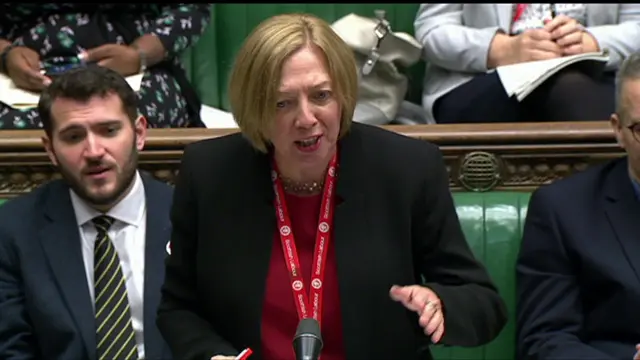 Image source, HoC
Image source, HoCShadow Scotland secretary Lesley Laird says David Mundell claims that "protecting the integrity of the UK is the most important thing to him," but suggests he has "flip-flopped" over his threat to resign over the Irish border.
She asks if he will resign if there is a border in the Irish sea introduced.
Mr Mundell says that wouldn't be acceptable to him or his Scottish Conservative colleagues.
Ms Laird says the minister has run out of ideas and suggests he backs Labour's plan for a customs union with the EU. The Scotland secretary says whatever agreement is achieved, the worst alternative would be Labour government.
Exiting the EU Committee
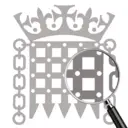 Select Committee
Select Committee
Parliament
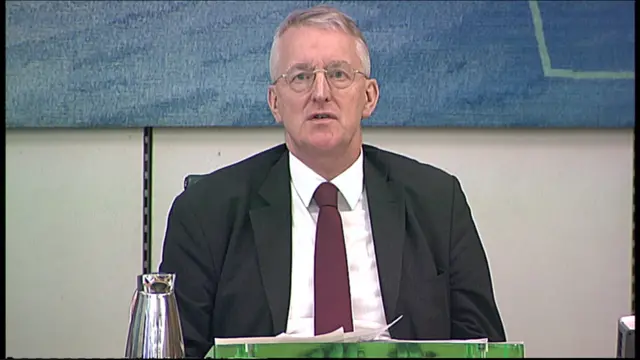 Image source, HoC
Image source, HoCCommittee chair Hilary Benn asks what the last date is the panel will have to press the "go button" on contingency arrangements for a no deal Brexit scenario.
Sir Chris Wormald replies the Department of Health and Social Care already "pressed go" on medicine stockpiling, and other decisions would come at later points.
Bernadette Kelly says the Department of Transport have introduced arrangements for road haulage permits and international driving permits. She adds there is no single date.
Jon Thompson says HMRC have passed most of those dates.
He adds there will be a "functional border but it will be sub optimal" and action in order to not feel the impact of a no deal scenario would have had to be taken "a long time ago".
The committee chair thanks the panel and all their staff. The session comes to a close.
Scotland Questions
 House of Commons
House of Commons
Parliament
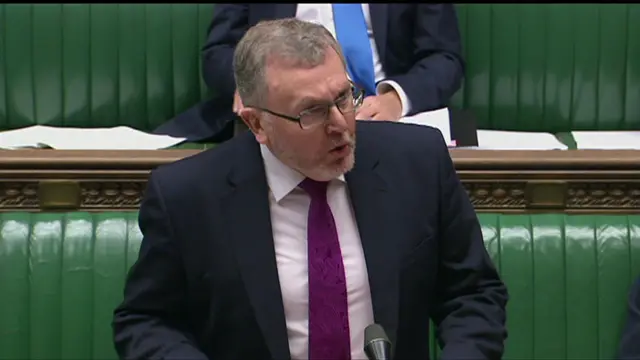 Image source, HoC
Image source, HoCSNP MP Brendan O'Hara begins Commons business with a question to the Scotland ministerial team about devolution powers after Brexit.
Scotland Secretary David Mundell says the EU Withdrawal Act confirmed that where law intersects, "those powers will fall directly with devolved administrations on Brexit day".
Mr O'Hara says the government should consider devolving immigration powers to the Scottish government in order to address "the depopulation crisis" facing rural Scotland.
The Scotland secretary says the Smith commission - which examined the need for further devolution powers after the referendum on Scottish independence - determined that immigration should not be a devolved power.
The SNP's Mhairi Black says 64% of Scottish voters now want to see immigration devolved to the Scottish Parliament. David Mundell repeats the Smith commissions findings, adding the the CBI Scotland "does not support having a separate immigration agreement".
Exiting the EU Committee
 Select Committee
Select Committee
Parliament
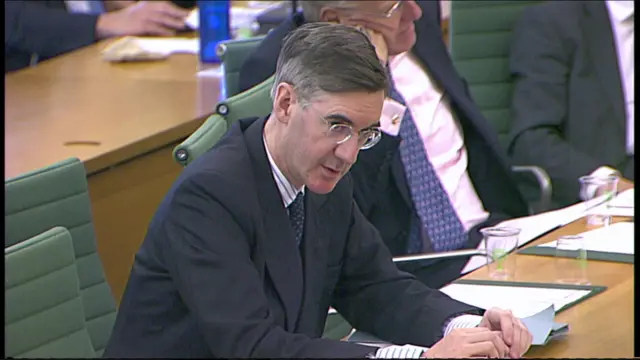 Image source, HoC
Image source, HoCConservative MP Jacob Rees-Mogg asks if it is the case that controls on non-EU trade have been mandated by the EU to "ensure that we meet their requirements" and there would be an opportunity to reduce the levels of controls on "countries that we are very comfortable trading with".
Permanent Secretary Jon Thompson replies it is possible that is true and it would be for ministers to decide.
He adds HMRC are working with a ministerial directive that the UK should assume it needs to maintain alignment with the EU customs code.
The Conservative MP says it is a "policy decision" that is leading to "extra expenditure" on customs.
Exiting the EU Committee
 Select Committee
Select Committee
Parliament
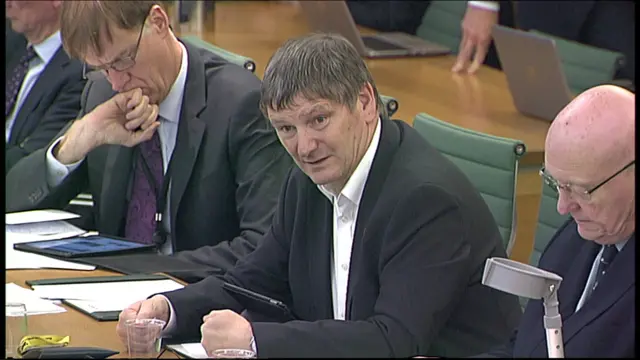 Image source, HoC
Image source, HoCSNP MP Peter Grant asks the panel if there have been any increase in the number of times their various departments have been asked not to share information with other departments or external stakeholders.
Sir Chris Wormald says people are looking for certainties and "we cannot currently give them".
Jon Thompson replies HMRC have created 19 working groups in three broad areas, geographical, transport and infrastructure.
Bernadette Kelly says the Department of Transport have been engaging extensively with stakeholders but have used non-disclosure agreements where they have been "appropriate".
The Cabinet Office's Sir Ian Cheshire says he has "not seen any evidence of that".
He adds increased use of non-disclosure agreements are an attempt to have "more conversations" and "not a push for greater secrecy".
Analysis
 Mark D'Arcy
Mark D'Arcy
Parliamentary Correspondent
Out if the frying pan…. Theresa May will head to Brussels for the latest EU summit immediately after PMQs. I wonder which she will find tougher?
With Brexit talks at what the government politely refers to as an “impasse”, the subject is bound to come up, and I understand today’s ritual demand for a further referendum, or “People’s Vote” will come from the Labour MP Siobhain McDonagh.
Also on the list of “bound to come up” topics is Dame Laura Cox’s excoriating report on bullying and harassment of Commons staff, which may also see further pot-shots at Mr Speaker Bercow, and some of the stuff of normal politics, like the government’s latest delay to the implementation of the new super-benefit, Universal Credit.
The last subject may tempt Jeremy Corbyn, because, unlike the impenetrable complexities of Brexit, it has direct and immediate resonance with voters, and he has made a practice of trying to focus on bread and butter issues. And Labour will raise the subject in one of their two Opposition Day debates, this afternoon.
If there is a Brexit intervention, the most interesting source for it would be the DUP – will one of their number signal rapprochement, or deepening hostilities, after last week’s clash over the post Brexit status of Northern Ireland?
And will one of the PM’s Brexit critics on the Conservative benches break cover, and say to her in public what so many of them are muttering to journalists in private?
Today’s list of questioners is pretty evenly split between government and opposition, and there will be an eclectic list of constituency questions – Labour’s Alex Norris will raise a report on hate crime in his home city of Nottingham, the Lib Dem Jamie Stone will complain about extra utilities costs and delivery charges for people who live in the highlands and islands of Scotland.
And watch out for Conservative ex-minister Tim Loughton, who’s set to ask whether the PM will back his private member's bill to allow heterosexual couples to form civil partnerships, now that is official government policy?
His bill is before MPs next Friday – so he will be urging her to take the opportunity to speed the change into law.
 House of Commons
House of Commons
Parliament
Whilst the headline event of the day is Theresa May's appearance in front of MPs for Prime Minister's Questions, before she heads of to meet with the EU for crucial talks, it's not the only thing happening in the Commons today.
From 11.30am MPs will get chance to put questions to Scotland ministers before the prime minister steps up.
After that, Conservative MP Paul Masterton will introduce his Collective Defined Contribution Pension Schemes Bill as a ten minute rule motion.
That's followed by two Labour Opposition Day debates - the first on Universal Credit, and the second on social care funding.
Independent MP John Woodcock leads the adjournment debate to end the day, focusing on drug trafficking and county lines policy.
Exiting the EU Committee
 Select Committee
Select Committee
Parliament
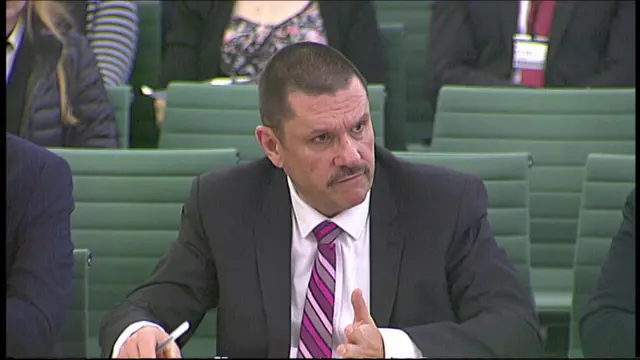 Image source, HoC
Image source, HoCThe DUP's Sammy Wilson asks about functions and risks around the border after exit.
Mr Thompson replies that the UK border is a "highly functioning" border and it is "highly efficient and technologically advanced".
The permanent secretary says after exit it would be "sub optimal" as there could be time delays or queues and additional administrative burdens for businesses.
He adds new technology could be uses to "get around the queues".
Mr Wilson says that if the Irish government and French government are prepared to cooperate there should not be huge delays.
Mr Thomson replies he'd have to guess the "mind of the President of France" and that he "cannot give any assurance whatsoever" of what will happen in a no deal scenario.
Exiting the EU Committee
 Select Committee
Select Committee
Parliament
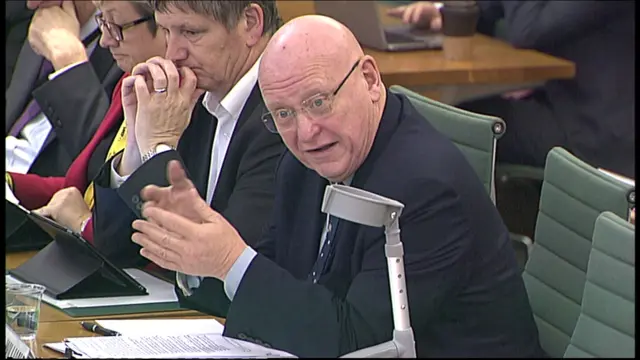 Image source, HoC
Image source, HoCHywel Williams of Plaid Cymru asks about contingency planning for Welsh ports, Holyhead and Fishguard.
Permanent Secretary Bernadette Kelly says it is the responsibility of the Welsh Assembly. She adds she is sure there is planning taking place.
HMRC's Jon Thompson says the roll on and roll off movements at Holyhead were counted at 499,000 in 2016.
Donald Tusk has demanded new facts at Wednesday's EU summit but as Theresa May prepares to go to Brussels, there's no sign of them.
Read MoreExiting the EU Committee
 Select Committee
Select Committee
Parliament
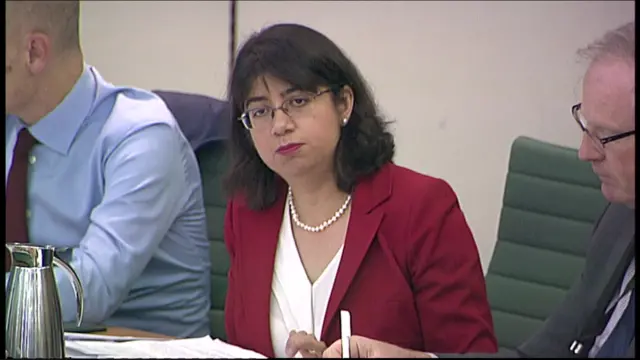 Image source, HoC
Image source, HoCLabour's Seema Malhotra asks about guarantees over the supply of medicines to the UK.
Sir Chris Wormald replies he "never uses words like guarantee in relation to health" and adds it is a "incredibly complex business".
He says the government is constantly making contingency plans.
The MP asks if there is a risk that medicines that are currently available will not be available in a no deal scenario.
Sir Chris tells her that if contingency planning is done right, the risk will be "minimised".
Exiting the EU Committee
 Select Committee
Select Committee
Parliament
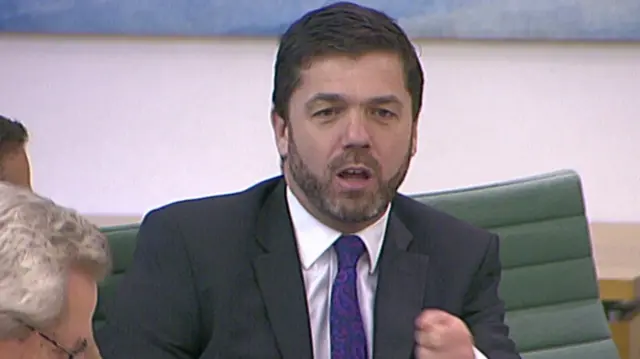 Image source, HoC
Image source, HoCConservative MP Stephen Crabb says Chief EU negotiator Michel Barnier made it clear to the committee there would be no "side discussions" if negotiations break down and there is a no deal. He asks if that is rhetoric.
Bernadette Kelly from the Department for Transport says she has seen "bare bones" agreements on aviation and the EU Commission has indicated continuity over the rail links.
The Health and Social Care Permanent Secretary Sir Chris Wormald replies it is "inconceivable" that there will not be discussions on issues of "mutual interest" such as on health protection.
Sir Ian Cheshire, from the Cabinet Office, says there will be a "level of pragmatism" but a no deal is not the government's preferred outcome.
Exiting the EU Committee
 Select Committee
Select Committee
Parliament
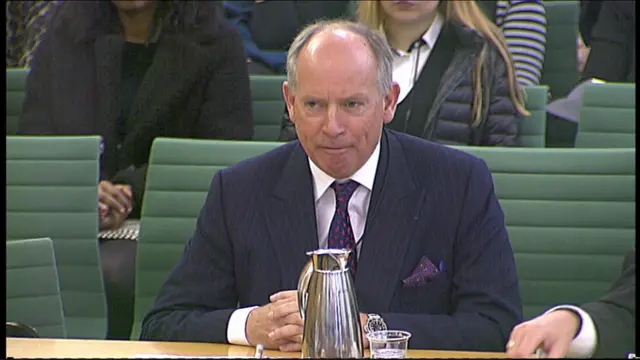 Image source, HoC
Image source, HoCSir Ian Cheshire says the impact of a "no deal" on people is difficult to predict
Jon Thompson, Permanent Secretary at HMRC, tells the committee they are concerned about business customers' readiness and awareness.
He adds there is still "policy uncertainty" around a deal.
Mr Thomson says HMRC has had less than a 1% response rate from communications sent to the 145,000 intra EU traders in the UK.
Mr Benn asks if businesses know what planning they need to do or are pretending a no deal will not happen.
The permanent secretary replies it could be either of those.
Questions move to Sir Ian Cheshire who says the impact of a "no deal" on people is difficult to predict.
The government lead at the Cabinet Office says after Brexit the issues will be become clear and the UK can move quickly “from our own end” but the government have to see the "shape of the reaction" from EU countries.
Parliamentary reporters tweet
Allow X content?
This article contains content provided by X. We ask for your permission before anything is loaded, as they may be using cookies and other technologies. You may want to read X’s cookie policy, external and privacy policy, external before accepting. To view this content choose ‘accept and continue’.
Exiting the EU Committee
 Select Committee
Select Committee
Parliament
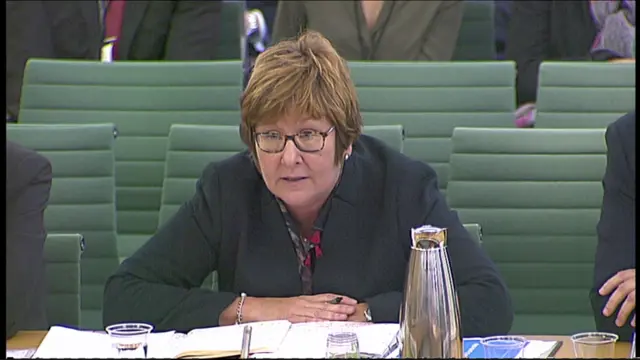 Image source, HoC
Image source, HoCPermanent Secretary Bernadette Kelly says there are four issues for the Department for Transport.
She says these are continuity of travel, minimising burdens such as driving permits, continuity of approvals and licensing in areas such as transport security and finally contingency planning for traffic particularly in Dover and Kent.
The chair asks if contracts for portable toilets have been signed in traffic contingency planning.
Ms Kelly replies she can confirm there are "advanced plans" but she does not know if a contract has been signed.
Labour's Hilary Benn asks about aviation and if on 1 April passengers who have booked flights to the EU will be able to fly.
The permanent secretary expects they will be able to as there is a "strong expectation” and a “very strong mutual interest” with the EU.
Exiting the EU Committee
 Select Committee
Select Committee
Parliament
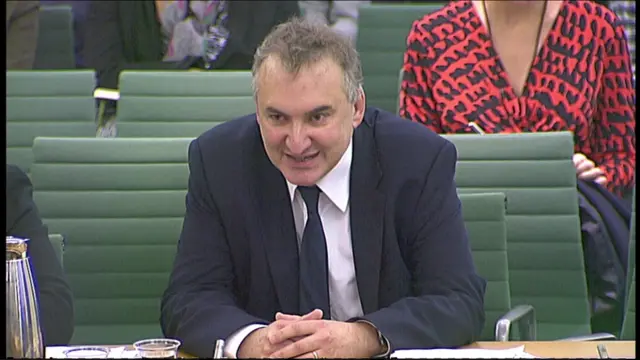 Image source, HoC
Image source, HoCThe committee gets underway, with committee chairman Hilary Benn asking what the impact of a no-deal Brexit would be on people.
Sir Chris Wormald says the issues relating to health are the same in a deal and a no-deal scenario.
The permanent secretary says the Department of Health and Social Care faces three issues: the supply of medicines, the workforce, and healthcare arrangements with the EU
He adds that health has not been a "huge issue of contention" with the EU, as most countries see a responsibility to ensure "vulnerable people are catered for".
Exiting the EU Committee
 Select Committee
Select Committee
Parliament
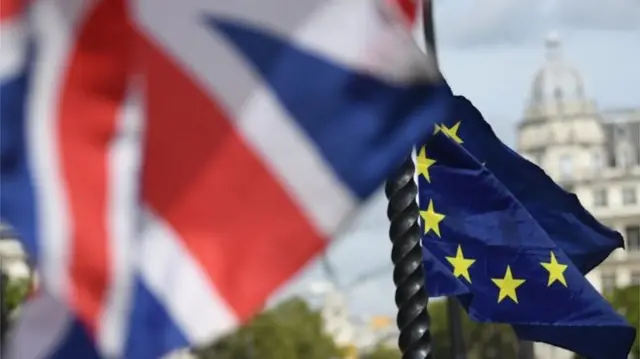 Image source, EPA
Image source, EPAToday's committee meeting comes after the government last week published its latest batch of technical guidance on what might happen in the event of a 'no deal' Brexit.
The notices contained warnings over potential disruption to Eurostar services, access to Netflix and electricity supplies in Northern Ireland.
This morning MPs will hear from officials at the Cabinet Office, HMRC and the transport and health departments.
Talks with the EU remain deadlocked over the question of how best to guarantee there won't be a hard border between Northern Ireland and Ireland after the UK's exit.
European Council President Donald Tusk has said there is “no optimism” for a breakthrough on the issue at this week's EU summit.
Every day is a Brexit day, as the prime minister continues negotiations in Brussels.
Ahead of the EU leaders' summit later today, this morning the Brexit committee is questioning Whitehall officials over the government’s ability to deliver the UK’s exit, including in a 'no-deal' scenario.
Business in the Commons chamber will get underway at 11.30am.
The Lords starts from 3pm.
News of John Bercow's plans follows damning report into the Commons' handling of bullying cases.
Read More